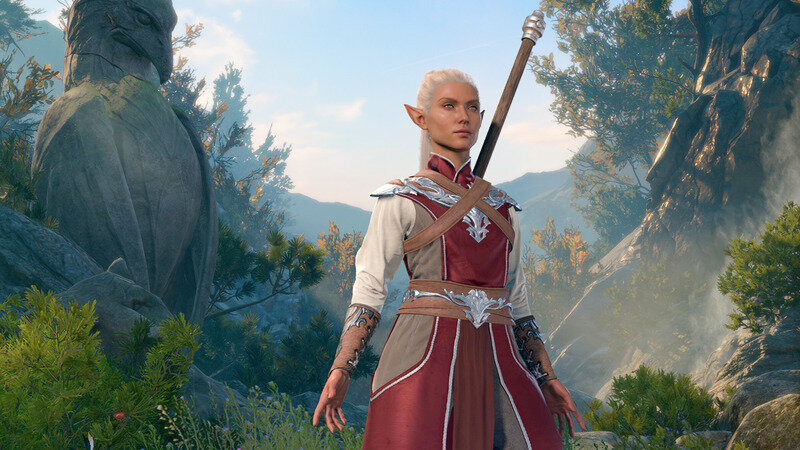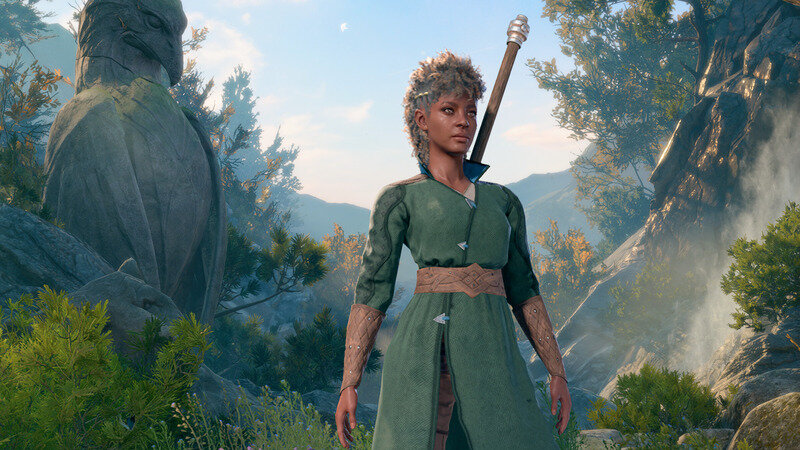Baldur’s Gate 3 features an extensive character creator where you can pick the race and class of your main PC. A class determines the playstyle and role your character plays in the team during the game. Classes are usually focused on either magic or weapon fighting. But what’s the different between the types of casters? The classes we’re comparing in this article are the Baldur’s Gate 3 Sorcerer Vs Wizard.
We are going to review what the both classes are, their advantages, playstyles, weaknesses, and more.
What is a Class in Baldur’s Gate 3?
A class in Baldur’s Gate 3 dictates the types of abilities your character has in game. The class not only determines the moves and role, but in games like Baldur’s Gate 3, it also plays a role in the character’s social standing and how NPC interacts with them. This can give you unique interactions in the game. Baldur’s Gate 3 has 12 different classes, each with its unique playstyles and differences.
This guide will focus on two classes in this list, the Sorcerer and the Wizard class.
Sorcerer
A Sorcerer is a spellcaster with innate magical abilities. Sometimes, it is more than they can manage. They don’t have as many spell slots as a Wizard but they also don’t have to prepare spells.
The Sorcerer’s primary attribute is Charisma, and they are proficient with daggers, quarterstaffs, and light crossbows. To increase your spell effectiveness, we’d recommend ensuring that your Sorcerer has a high charisma score right from the start.
You can pick between three Sorcerer subclasses (known as Origins): Wild Magic, Draconic Bloodline, and Storm Sorcery. Each subclass adds specific bonuses to your character.

Credit: Larian Studios / Sophie McCarthy
Draconic Bloodline
You don’t have to be a Dragonborn to choose the Draconic Bloodline subclass. Regardless of race, you’ll receive elemental resistances and abilities according to the type of dragon your bloodline comes from. Silver Dragonborns are resistant to cold damage, gold to fire damage and so on.
Players will also gain abilities that boost damage dealt by spells that match their bloodline element and automatically learn a spell corresponding to their chosen dragon type.
Wild Magic
Wild Magic Sorcerers aren’t for the feint of heart. We’d really only recommend choosing Wild Magic if you’re a DnD veteran and are familiar with the spell list already. This is because the effects of Wild Magic spells are random. You might not always get the result that you want. It really adds an extra layer of complexity and excitement to your battles, but can make them harder.
Stormy Sorcery
Storm Sorcerers, as the name implies, wield the power of storms. At level 1, they get “Tempestuous Magic”, allowing them to fly as a bonus action after casting any level one or higher spell.
At level 6, they get “Heart of the Storm”, creating a localized storm whenever they cast a spell, dealing thunder or lightning damage. After level 11, they get “Storm’s Fury”, which deals damage to any enemy striking them with melee attacks, also knocking them back.
Wizard
Whereas a Sorcerer’s magic is innate, a wizard must study for years with mentors handpicked by Mystra herself. In short, wizards strive to be the best spellcaster in Faerun and beyond. A Wizard’s primary attribute is Intelligence, and he is proficient with daggers, quarterstaffs, and light crossbows. Make sure to build your Wizard with a high intelligence score from the start to increase their effectiveness.

Credit: Larian Studios / Sophie McCarthy
There are total of 8 subclasses (known as Schools of Magic) for Wizards:
School of Evocation
Evokers are known for their ability to deal massive amounts of damage in combat. They excel at clearing out groups of enemies with area-of-effect spells and are more geared towards damage than utility. If you choose to travel with Gale in your party, he’ll default to an Evocation wizard to give him the best versatility.
School of Abjuration
If your party is in need of a protector, this might be the subclass for you. Abjurers can nullify others’ magic in order to protect their allies, which can really come in handy later on in the game.
It’s important to keep your Abjuration wizard out of the main fight as a lot of their spells require concentration. If they take damage and break concentration, you’ll have to spend another spell slot to recast it.
School of Necromancy
Necromancers can summon skeletons, zombies, and other undead minions to fight alongside them. They also have access to spells that can weaken or harm their enemies, as well as abilities that can manipulate life force and heal themselves or their allies.
They’re good all-rounders and can really take advantage of the terrain around them – especially if there are a lot of enemies to reawaken as allies.
School of Illusion
We’re sure you’ll be completely shocked to hear that the Illusion Wizards are great at creating illusions. Simple, right? They can use their spells to confuse and confound their enemies, making them see and hear things that aren’t there or hiding themselves and their allies from view.
School of Divination
The concept of Divination is an interesting one. These wizards excel at planning ahead and controlling their enemies but they can pump out some damage too. They can use their spells to uncover secrets, predict their enemies’ actions, and avoid danger before it strikes.
School of Conjuration
Conjurers provide additional firepower by summoning creatures to fight alongside them. The higher you level your conjuration wizard, the more powerful the creatures they can summon. Each of the summons will have their own turn in battle and their own set of actions, making them create for clearing hordes of enemies.
School of Enchantment
Enchantment is an interesting concept in DnD that is carried over to Baldur’s Gate. Both living and non-living things can be enchanted. These wizards can use their spells to charm or deceive NPCs, persuade enemies to abandon their attacks, or even turn them against their allies.
School of Transmutation
Transmutation wizards are versatile spellcasters capable of adapting to a wide range of situations. They can use their magic to overcome obstacles, solve puzzles, or gain an advantage in combat. Transmutation spells can be used for utility, such as creating bridges or unlocking doors.
Final Verdicts
So who comes out on top of the Baldur’s Gate 3 Sorcerer vs Wizard showdown. As is often the case in RPGs, no class is objectively better than the other. Each offers a unique play style and experience. Here are our observations for each class to help you narrow in on your decision.
- Sorcerer:
This class is the definition of Glass Cannon, a sorcerer who has high offensive capabilities with powerful and destructive spells. However, while they excel in power, they lack versatility. They have a limited amount of spell slots which means they are restricted to what they have at the time.
- Wizard:
A wizard is the opposite of a sorcerer, they have a vast amount of spells at their disposal, although not as powerful. They are great for players who like to be tactical and control multiple aspects of the battlefield. This is why preparation is key for the wizard, so assess upcoming battles and choose the right spells.


















You must be logged in to post a comment Login